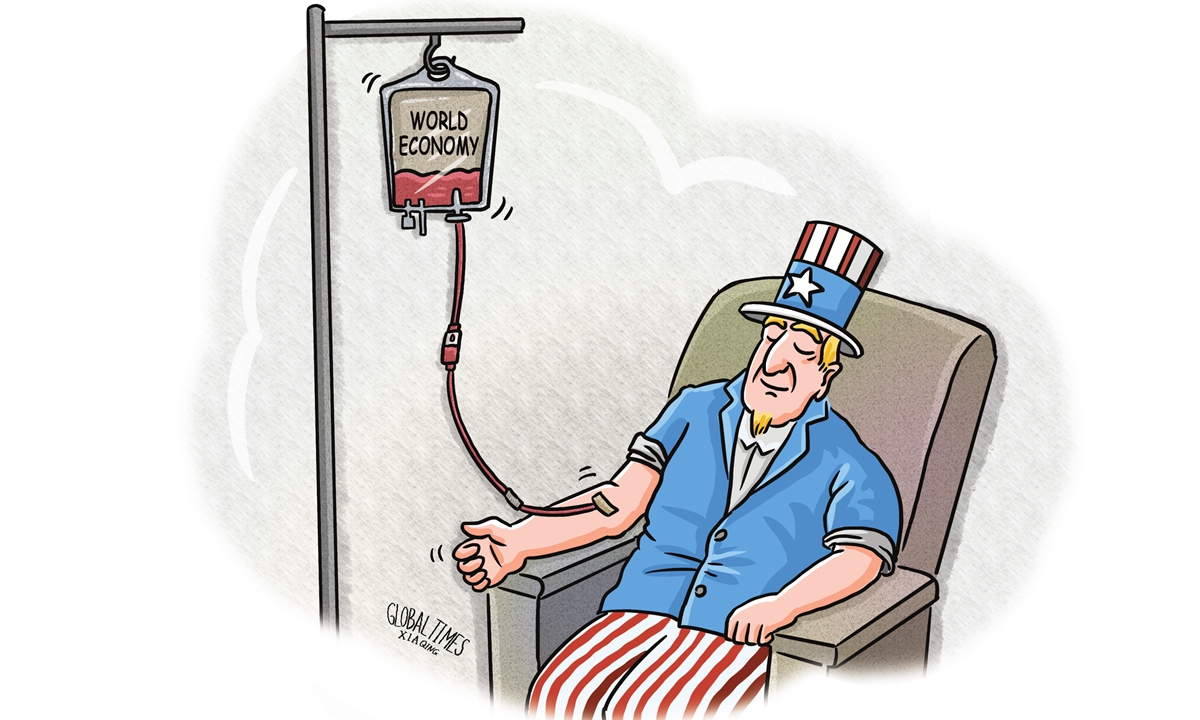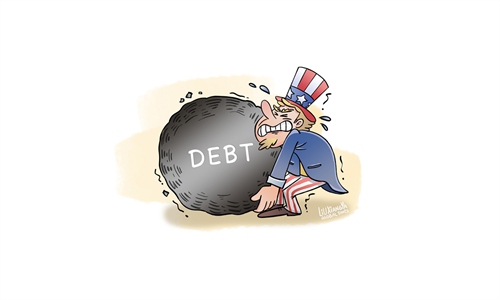
Illustration: Xia Qing/GT
In the first half of 2023 an extraordinary situation, with international geopolitical consequences, developed in the US economy. Its own official data showed that the US was wearing out more capital than it was producing. In the second quarter of 2023, in annualized figures, US capital creation was $4.5 trillion but depreciation was $4.6 trillion. Therefore, rather startlingly, in net terms, the world's No.1 capitalist economy wasn't producing any capital! The seriousness of this is shown by the fact that it has only occurred twice before in US history - in 1931-34, the depth of the Great Depression, and 2008-10, the worst period of the Great Financial Crisis.The reasons this had such large international political implications, however, lay in why if the US was consuming more capital than it created it could continue to grow. This was because the US was using capital produced by other countries to finance its own growth.
In precise figures, US data shows that in the second quarter of 2023 it utilized $850 billion of capital created in other countries to finance its own investment. The inevitable international impact of this was therefore that this $850 billion of capital couldn't be used by the countries that created it for their own national development. In objective terms, the US was acting as an economic "parasite" - the world's largest economic parasite. In technical economic terms, a country depending for financing development on capital from other countries may be termed to have a "parasitic mode of capital accumulation."
It is important to understand that this US situation is not a purely technical economic one. It profoundly affects world politics and China's position within it. In particular, combined with China's own self-financing, it helps explain the success of the Belt and Road Initiative (BRI), BRICS and the increasing willingness of a wide range of countries to act independently of the US. It helps explain why socialist China is able to lead such organizations that contain a wide range of capitalist countries.
The consequence of this situation may be clearly understood by making a contrast to the US earlier peak period of dominance. From the beginning of the 20th century until the 1980s the US' productive strength was so great that it almost continuously created not only enough capital to finance its own domestic investment but also a capital surplus which it could export and which other countries could use for their own growth.
In numbers, from 1900 to 1980, at today's prices, the US annually exported an average $200 billion in capital via its balance of payments surpluses - over the entire period an enormous $16 trillion. With such resources, in addition to innumerable smaller projects, the US could finance huge international initiatives such as the Marshall Plan for Europe after World War II to confront the USSR, the Alliance for Progress in Latin America after the Cuban revolution, assistance to build the Asian Tiger economies during the Vietnam War.
This situation profoundly affected the US's international position. Given such economic resources, the US could use not only military violence to attempt to impose its international order - the Korean War, the Vietnam War etc. It could also offer economic aid. Given US export of capital it could in essence say to other countries "you create your own capital for national growth, but we can add to this by speeding your national development." Given this many countries, particularly developing ones, were prepared to go along with US policies. To use Marxist terminology, the US's international position rested not only on coercion but also consent.
But now that the US requires taking capital from other countries to finance its own development, this situation is reversed - a trend that has been developing for some time. Since 1980, at today's prices, the US has been taking an annual average $680 billion a year of capital from other countries. Cumulatively by 2022, this had become a gigantic $29 trillion - $29 trillion of capital which could not be used for the development of the countries which produce it but which had been used by the US economic parasitism on a gigantic scale.
The US still possesses resources to aid individual countries if it wishes. But overall, the US is no longer aiding other countries by exporting capital to them. It instead requires other countries to subordinate their own development to the US. It says in essence to them "don't use your resources for your own development, instead give them to US development."
Any country wishing to maximise its own national development, naturally, can't go along with this. This applies not only to socialist countries, China being the largest, but also capitalist countries prioritizing national development.
China, in contrast, not only creates enough capital to finance its own domestic investment but every year since 1994 it has had a surplus of capital above that which it can export to add to development of other countries. If the US says to other countries "give your capital to us to finance US development" - a "US wins, you lose" situation - China says "we support you using your national resources for your own national development, and in addition we can aid the development of your country's financing of productive and infrastructure development" - a "win-win" situation. This combination of China's own development with the US economic parasitism explains the large-scale success of BRI and BRICS.
It explains why 150 countries, with extremely diverse economic strategies, levels of development and political systems, have joined the BRI. And why countries with such extremely different development strategies and political systems as Saudi Arabia, Iran, Argentina, Ethiopia, Egypt, the United Arab Emirates, South Africa, Russia, China, India, and Brazil have joined BRICS - with many others applying for membership.
Purely theoretically the US could break out of its economic parasitism but in practice it can't. The US cannot finance its increase in investment because it uses a gigantic amount of its economy on what is objectively unnecessary wasteful consumption. On the military the US spends annually $970 billion, 3.6 percent of GDP, far more than any other country. The US health system is stupendously inefficient - 18 percent of US family expenditure, 11 percent of GDP, goes on health care, by far the world's highest. But its health results are terrible with US life expectancy almost four years less than the average for advanced economies and six years less than a country such as France.
US reforms of reducing military expenditure to the level of other countries and creating an efficient health system would release hundreds of millions of dollars to finance US investment. But the US in practice won't carry theses out because they would require a change to a less aggressive foreign policy and tackling vested interests in the US health system.
China's economic success, together with the US "parasitic mode of capital explanation," explains why Western claims that the BRI and BRICS cannot succeed because they are allegedly narrow political "pro-China/anti-US" movements carried no weight for countries joining them. The BRI and BRICS are not political "anti-US/pro-China" organizations, they are "pro-development" movements - extremely attractive to any country wishing to develop its own national productive forces.
The author is a senior fellow at Chongyang Institute for Financial Studies, Renmin University of China. opinion@globaltimes.com.cn


